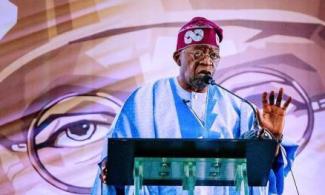
NEFGAD warned that the policy would have dire diplomatic implications and therefore demanded a stay of action on the policy.
A civic organisation, the Network for the Actualisation of Social Growth and Viable Development (NEFGAD), has written to President Bola Tinubu, saying that the expatriate employment levy his government introduced through the Ministry of Interior is "discriminatory, duplicative and anti-investment."
NEFGAD warned that the policy would have dire diplomatic implications and therefore demanded a stay of action on the policy.
The organisation issued the warning in a letter sent to the President on Friday and signed by its Head of Office, Mr Akingunola Omoniyi.
NEFGAD in the letter said that it was worried about the possible diplomatic implications of the policy in the likely event of reciprocity by foreign countries whose citizens are forced to cough out thousands of dollars for merely choosing to invest and or work in Nigeria.
This comes as the Nigerian government launched Expatriate Employment Handbook (EEH), an initiative of the Ministry of Interior where the government announced a levy of between US$10,000 to US$15,000 on employers that employ expatriates, claiming that it was aimed at enhancing skills transfer in Nigeria.
In the letter, Akingunola argued that the Expatriate Employment Levy was entirely discriminatory and tends to generate dire diplomatic, legal and economic problems for the country than it was intended to solve by the proponents.
According to him, a countrywide peer review conducted on the Expatriate Employment Levy showed that “Nigeria is the only country in the world where such a humongous amount of between $10,000 – $15,000 is levied on foreigners for employment reasons.”
He said “It is purely exploitative and in view of the current economic hardship, Nigeria cannot afford to maintain such an unfair and incredulous reputation.”
Akingunola further noted that “The idea of the Interior Ministry on the policy is utterly duplicative, because, the extant Handbook on Expatriate Quota Administration in Nigeria (HEQAN) (Revised, 2022) formulated by the same Ministry of Interior mandates all expatriates and Nigerian firms to employ at least two Nigerian understudies for each expatriate employed.
“The HEQAN also imposed penalties of varying degrees on companies that violated the understudy rules. What is required of this regulation to make a desired impact is enforcement, a task the Interior Ministry had failed to accomplish."
He added that the “Policies that have serious international bearing and portends immense diplomatic implications should essentially have the involvement of the National Assembly which will guarantee necessary and rich citizens and stakeholders input rather than mere ‘ministerial invocation’ that this Expatriate Levy policy suggests.
‘“We should bear in mind that there are more Nigerians working overseas who the possible reciprocal effect of the expatriate levy policy will greatly and negatively affect.
“To avoid disastrous diplomatic and economic distortions that may arise in the form of diplomatic retaliations and disincentives to foreign investments in the country, the Group call on Mr President to put a hold on the implementation of the policy to pave the way for necessary considerations by the National Assembly and or relevant stakeholders.”